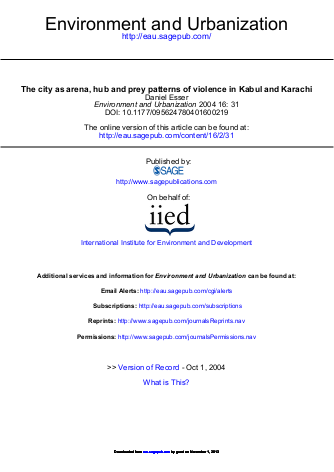
Violence in today’s cities limits the scope for effective urban governance. It also destroys opportunities for collective action conducive to political and economic development, thus jeopardizing the regional competitiveness of these cities. A myriad of causal factors have been suggested, including urbanization, ethnic diversity, social fragmentation and widespread poverty. The cases of Kabul in Afghanistan and Karachi in Pakistan illustrate these dynamics, but also demon- strate that politico-historical settings, weak legitimate institutions of control, and the fluidity between war and peace in south-central Asia are crucial to an expla- nation of their trajectories. Therefore, strategies to improve the stakes for effective urban governance have to focus on enhancing local accountability, fostering the transformation of institutions of public security and advancing opportunities for non-violent political participation. Nonetheless, supra-urban structures of economic scarcity, ideological strife and struggles for political leverage, in which the two cities are embedded, need to be understood, as they constrain the scope for intervention and improvement.
Resource collections
- UN Habitat - Urban Response Collection
- Urban Response - Urban Crisis Preparedness and Risk Reduction
- Urban Response Collection - Community Engagement and Social Cohesion
- Urban Response Collection - Economic Recovery
- Urban Response Collection - Environment and Climate Change
- Urban Response Collection - Housing, Land and Property
- Urban Response Collection - Urban Crisis Response, Recovery and Reconstruction
- Urban Response Collection - Urban Resilience